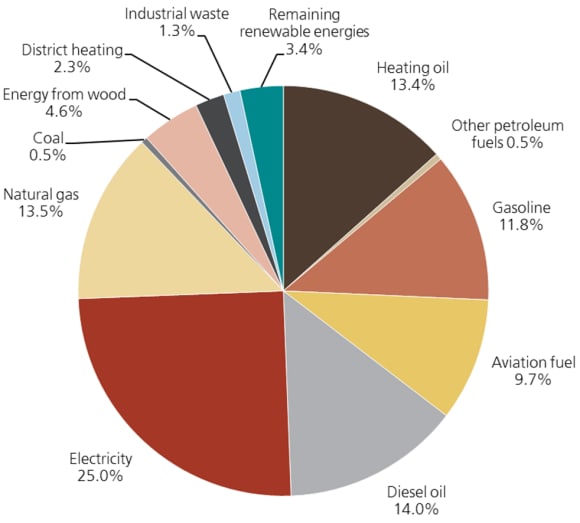Zurich, 25 September 2019 – In recent decades, air pollution has significantly increased, particularly in emerging markets. Due to population and economic growth, as well as urbanization, the demand for energy and electricity has grown considerably. This structural trend is likely to continue, so that a further increase in global greenhouse gas emissions can be expected in the medium term. At the same time, the international community has pledged a reduction. Political and technological solutions are required to limit global warming.
Energy-related Swiss emissions are relatively low by international standards. With just under 37 million tons of CO₂, they account for 0.1% of global emissions. This is thanks to a low consumption of fossil fuels and low emissions from energy production. Around 60% of Swiss energy is already produced sustainably – one of the highest percentages in the world. The backbone of this is hydropower, at around 55%; while solar energy is the fastest growing source of generation. The decision to gradually pull out of CO2-free nuclear energy (36%) is likely to become a challenge for energy policy. Coal and natural gas are used comparatively little in Switzerland. The largest potential for fossil fuel savings therefore lies in petroleum consumption, particularly in the areas of building heating and transport.
Potential for optimization in Switzerland
Potential for optimization in Switzerland
Petroleum products such as heating oil and motor fuel are by far the most important energy sources in Switzerland. Since the 1990s, the share of buildings heated with oil has dropped from 60% to just under 40%, but it is still higher than in most other European countries. A further substitution of the use of oil as well as gas heating systems (e.g. with heating pumps) could significantly reduce local emissions once again.
At 35%, fossil fuels are by far the largest component of the total energy consumption. Diesel oil and gasoline account for 14% and 12% respectively; the rest is aviation fuels. The transport sector can therefore make the largest contribution to reducing CO2 emissions in Switzerland. Thanks to a wider range of products and technological improvements, the electric car sector is expected to grow significantly. A substitution of gasoline and diesel vehicles would have a significant impact, but requires the expansion of the infrastructure. This includes electric charging stations, energy storage facilities and electricity grids. Investment is necessary but expensive. The expansion has been progressing slowly so far. Success depends on political principles (e.g. simplified approval procedures), but also on consumer demand.
Political incentives in the context of the energy strategy 2050
Political incentives in the context of the energy strategy 2050
Reducing petroleum consumption thus enables Switzerland to further reduce its greenhouse gas emissions. Economic incentives can speed up modernization. In order to steer the consumption and energy mix, taxes and fees on fossil fuels are likely to rise in the future. While subsidies are to be avoided, an incentive tax on fossil fuels and propellants seems sensible. What is crucial is that it does not increase the public expenditure quota, but is fully and evenly rebated to the population and companies. The energy strategy 2050 sees an incentive tax as a key steering instrument. After parliament has rejected this, it is now necessary to find a compromise as part of the CO2 legislation.
Sustainability as an opportunity for the economy
Sustainability as an opportunity for the economy
Ultimately, technological progress can also contribute to reduce CO₂ emissions. With research and development, Switzerland can make a strong contribution here. Swiss companies are highly innovative. In international rankings for research and development, they often reach top positions.
The climate and sustainability goals open up opportunities in virtually all sectors of the Swiss economy. Examples include energy and transport, technology and telecommunications, manufacturers of health and consumer goods, the real estate and construction industry as well as the financial sector. With the promotion of basic research in many of these sectors, the government can also make an important contribution. If Swiss companies succeed in supporting the transition to a more sustainable economy with suitable solutions, they could benefit from a first mover advantage and later play off their technological leadership in global markets.
Switzerland with a high proportion of petroleum products
Switzerland with a high proportion of petroleum products
Total end consumption of energy sources

UBS Switzerland AG
Contact
Carsten Schlufter
UBS Chief Investment Office GWM
Tel. +41-44-234 34 87
carsten.schlufter@ubs.com
Daniel Kalt
UBS Chefökonom Schweiz
Tel. +41-44-234 25 60
daniel.kalt@ubs.com
Sibille Duss
UBS Chief Investment Office GWM
Tel. +41-44-234 69 54
sibille.duss@ubs.com

